
05/15/2009
Movies Home / Entertainment Channel / Bullz-Eye Home
Tom Hanks has an image problem. It's that he's – you know – polite, decent, pleasant. No matter how darkly interestingly some of his roles have been since relatively early in his career, we still think of the hilariously likable guy and gifted comic actor who turns up on award shows and "SNL," not the sometimes tortured, more complex characters he insists on occasionally playing – and playing increasingly well.
Jimmy Stewart, the star to whom Tom Hanks will forever be compared, had a similar deepening and darkening of his persona during his middle years, but his experiences in the World War II Army Air Corps provided the kind of simplistic explanation we writers like to hang onto. So, how do we account for the power of his shattering performance in "Saving Private Ryan" since, as far as we know, the closest Tom Hanks has been to the insanity of random violence is being in the same room with Mel Gibson?
Could if be that acting is a craft – the kind you get better at with practice? Could it be that we all have a certain amount of darkness and fear in our lives and that good actors are just extremely skilled at figuring out how to access that darkness? Looking through this assortment of lesser-known performances from Hollywood's best-liked, double Oscar-winner, multi-hyphenate actor-producer-director-writer and all-around power player, one can see real development and, more intriguingly, proof that you don't need to be half-insane to be a good actor.
"Bachelor Party" (1984)
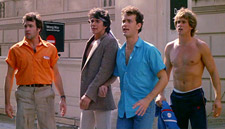 Even after being pegged as a rising star during his run as a sitcom celebrity with "Bosom Buddies," Hanks reportedly didn't expect to be much more than a flash in the pan. Which may explain why he opted to be a last-minute replacement for comic Paul Reiser ("Mad About You") in an unpromising low-budget comedy. As is now Hollywood history, Hanks' next gig was another modest, if vastly better, comedy – the surprise hit, "Splash." As luck would have it, Ron Howard's breakthrough film would be released first, thus ensuring the profitability of "Bachelor Party;" it had a "name" in the lead, and one of those rare titles that just kind of sells a movie to the male demographic. Seeing it now is an education. Delivering a part obviously written for "a Bill Murray type," Hanks does the absolute best he can while saddled with mostly lame gags, a spackled-together story, and a mixed bag of a supporting cast mates that, at times, makes his job even harder. Nevertheless, the young star salvages just enough scenes, finding laughs despite having to play a character who is, as written, offensively unlikable. This will always be "the film Tom Hanks doesn't want you to see." But in a funny way, it might be the film that also assured his mid-'80s stardom. It proved to audiences that Hanks was someone they could trust to deliver as much entertainment as he could manage, in just about any circumstance.
Even after being pegged as a rising star during his run as a sitcom celebrity with "Bosom Buddies," Hanks reportedly didn't expect to be much more than a flash in the pan. Which may explain why he opted to be a last-minute replacement for comic Paul Reiser ("Mad About You") in an unpromising low-budget comedy. As is now Hollywood history, Hanks' next gig was another modest, if vastly better, comedy – the surprise hit, "Splash." As luck would have it, Ron Howard's breakthrough film would be released first, thus ensuring the profitability of "Bachelor Party;" it had a "name" in the lead, and one of those rare titles that just kind of sells a movie to the male demographic. Seeing it now is an education. Delivering a part obviously written for "a Bill Murray type," Hanks does the absolute best he can while saddled with mostly lame gags, a spackled-together story, and a mixed bag of a supporting cast mates that, at times, makes his job even harder. Nevertheless, the young star salvages just enough scenes, finding laughs despite having to play a character who is, as written, offensively unlikable. This will always be "the film Tom Hanks doesn't want you to see." But in a funny way, it might be the film that also assured his mid-'80s stardom. It proved to audiences that Hanks was someone they could trust to deliver as much entertainment as he could manage, in just about any circumstance.
"Volunteers" (1985)
 Lawrence Whatley Bourne III, an insufferably overconfident and under-caring Boston Brahmin who joins the early '60s Peace Corps to flee gambling debts, is obviously not one of Hanks' likable everymen. Indeed, his character is, in modern parlance, a complete douchebag, dissing more typically idealistic volunteers such as John Candy's ultra-positive cold war engineer "Tom Tomerson from Tacoma," and attempting to seduce Beth Wexler, an intelligent and attractive woman of Hebrew extraction (who in real life is Greek-Bulgarian Rita Wilson). But Hanks commits here to the whole package, the snobbery and sense of entitlement, the ridiculously exaggerated upscale New England frozen lower jaw, and later to a personal transformation that's an inapt spoof/homage of Humphrey Bogart's moral transformation in "Casablanca." Nevertheless, Hanks works out some nice chemistry not only with his future long-term wife, Wilson, but also with Gedde Watanabe ("Sixteen Candles") as a wisecracking Thai villager who sees something likable in the character he regularly addresses as "asshole." It's impossible to argue that "Volunteers" is one of Hanks' greatest performances – we're not sure any actor could have pulled this guy off – but it also shows that, even when saddled with basically half of a character, he was more than capable of holding an entire film together.
Lawrence Whatley Bourne III, an insufferably overconfident and under-caring Boston Brahmin who joins the early '60s Peace Corps to flee gambling debts, is obviously not one of Hanks' likable everymen. Indeed, his character is, in modern parlance, a complete douchebag, dissing more typically idealistic volunteers such as John Candy's ultra-positive cold war engineer "Tom Tomerson from Tacoma," and attempting to seduce Beth Wexler, an intelligent and attractive woman of Hebrew extraction (who in real life is Greek-Bulgarian Rita Wilson). But Hanks commits here to the whole package, the snobbery and sense of entitlement, the ridiculously exaggerated upscale New England frozen lower jaw, and later to a personal transformation that's an inapt spoof/homage of Humphrey Bogart's moral transformation in "Casablanca." Nevertheless, Hanks works out some nice chemistry not only with his future long-term wife, Wilson, but also with Gedde Watanabe ("Sixteen Candles") as a wisecracking Thai villager who sees something likable in the character he regularly addresses as "asshole." It's impossible to argue that "Volunteers" is one of Hanks' greatest performances – we're not sure any actor could have pulled this guy off – but it also shows that, even when saddled with basically half of a character, he was more than capable of holding an entire film together.
"Nothing in Common" (1986)
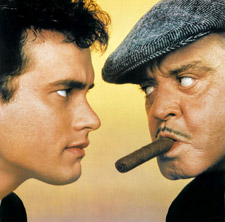 A later-life variation on "Kramer vs. Kramer," Garry Marshall's dramedy brings us Hanks as David Basner, a life-of-the-party adman. He finds that his sweet-natured mother (Eva Marie Saint of "On the Waterfront" and "North by Northwest") has sensibly decided to leave his super salesman father (Jackie Gleason) after decades of neglect and serial adultery, and suddenly finds himself in serious role-reversal mode. Hanks has always regarded this film as his acting breakthrough and, seeing it 23 years after the fact, it's impossible not to agree. Not only does "Nothing in Common" find Hanks punching in the same weight class as his legendary costar, Jackie Gleason ("The Honeymooners," "The Hustler"), but for the first time in his film career, it shows him as being no less deft than Gleason at threading the emotional needle between comedic acting and dramatic acting, and simply acting. His scenes with Gleason – a huge presence in every sense and reputedly an extraordinarily "difficult" man – are powerfully heartfelt and often shockingly brutal, consistently transcending some rather schlocky writing and direction. Still, as great as Gleason was, it is Hanks who carries the bulk of the film on his shoulders. He does so with precision, milking comedy from his encounters with Hector Elizondo as his vain but good-natured boss/buddy and portraying an uncomfortable affair with Sela Ward as a hard-bitten young executive in a fashion that's almost chilling. "Breakthrough" is the word.
A later-life variation on "Kramer vs. Kramer," Garry Marshall's dramedy brings us Hanks as David Basner, a life-of-the-party adman. He finds that his sweet-natured mother (Eva Marie Saint of "On the Waterfront" and "North by Northwest") has sensibly decided to leave his super salesman father (Jackie Gleason) after decades of neglect and serial adultery, and suddenly finds himself in serious role-reversal mode. Hanks has always regarded this film as his acting breakthrough and, seeing it 23 years after the fact, it's impossible not to agree. Not only does "Nothing in Common" find Hanks punching in the same weight class as his legendary costar, Jackie Gleason ("The Honeymooners," "The Hustler"), but for the first time in his film career, it shows him as being no less deft than Gleason at threading the emotional needle between comedic acting and dramatic acting, and simply acting. His scenes with Gleason – a huge presence in every sense and reputedly an extraordinarily "difficult" man – are powerfully heartfelt and often shockingly brutal, consistently transcending some rather schlocky writing and direction. Still, as great as Gleason was, it is Hanks who carries the bulk of the film on his shoulders. He does so with precision, milking comedy from his encounters with Hector Elizondo as his vain but good-natured boss/buddy and portraying an uncomfortable affair with Sela Ward as a hard-bitten young executive in a fashion that's almost chilling. "Breakthrough" is the word.
"Every Time We Say Goodbye" (1986)
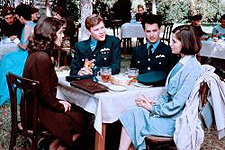 If you've seen this, then count yourself a real Tom Hanks fan. It's easily the most "hidden" film on our list, and we very nearly missed it ourselves (though we're glad we didn't). An engaging and very old fashioned romance set during World War II, it stars Hanks as an American flyer stationed with England's RAF in Jerusalem who falls hard for Sarah (Cristina Marsillach), a beautiful Sephardic Jew. Her family is happy to have a handsome and heroic gentile over for dinner, but they react violently when they get wind of the brewing romance. Shot in English and Ladino (the dialect spoken by Sephardic Jews after their 15th century expulsion from Spain), "Every Time We Say Goodbye" is an effecting and mostly well acted, if improbable, romance written and directed by Moshé Mizrahi, an award-winning Israeli director who also worked in France. The funny thing about the film, which sweetly hearkens back to Hollywood romances of the '40s, is that the multilingual Mizrahi doesn't seem to understand the differences between American and British English. Much of Hanks' dialogue sounds as if it was written for such classic-era British-American superstars as David Niven and Ronald Colman. His struggle with these lines becomes apparent at times, but fortunately, Hanks has a talented costar, a very strong supporting cast to work with, and a second nature ability to make a connection with all of them.
If you've seen this, then count yourself a real Tom Hanks fan. It's easily the most "hidden" film on our list, and we very nearly missed it ourselves (though we're glad we didn't). An engaging and very old fashioned romance set during World War II, it stars Hanks as an American flyer stationed with England's RAF in Jerusalem who falls hard for Sarah (Cristina Marsillach), a beautiful Sephardic Jew. Her family is happy to have a handsome and heroic gentile over for dinner, but they react violently when they get wind of the brewing romance. Shot in English and Ladino (the dialect spoken by Sephardic Jews after their 15th century expulsion from Spain), "Every Time We Say Goodbye" is an effecting and mostly well acted, if improbable, romance written and directed by Moshé Mizrahi, an award-winning Israeli director who also worked in France. The funny thing about the film, which sweetly hearkens back to Hollywood romances of the '40s, is that the multilingual Mizrahi doesn't seem to understand the differences between American and British English. Much of Hanks' dialogue sounds as if it was written for such classic-era British-American superstars as David Niven and Ronald Colman. His struggle with these lines becomes apparent at times, but fortunately, Hanks has a talented costar, a very strong supporting cast to work with, and a second nature ability to make a connection with all of them.
"Punchline" (1988)
 Tom Hanks' goodhearted persona was further bolstered by the single role that seemed to assure his superstardom, his tour de forceperformance as a very literal embodiment of the Peter Pan complex in "Big." So, his work that same year as a nastily self-absorbed comic who reluctantly helps Sally Fields' moonlighting housewife hone her comedy skills raised some eyebrows. Indeed, Steve Gold is the flip side of his "Big" character – a man's whose inability to grow up has rendered him an apparently unfeeling shell of a human, interested only in "killing" an audience with comedy. Gold's casual cruelty is later revealed to be a cover for an excess of sensitivity – though sensitivity should never be confused with basic human decency. And it's no wonder he finds himself falling for Fields' downtrodden hausfrau; she's the first person he's allowed close enough to feel any sort of empathy for, possibly in decades, possibly ever. Hanks' work here is all exposed nerve endings, pain and self-hatred – covered, of course, with lots and lots of gags, which Hanks/Gold knows quite well just how to deliver, even if most of his bits are, as written, pretty weak. "Punchline" confused audiences because it was a movie about comedians with few laughs and a lot of pain. Still, it's a compelling, if highly imperfect, piece of work and Hanks' extraordinary performance makes "Punchline" somewhat like Steve Gold – as difficult to forget as he is hard to like.
Tom Hanks' goodhearted persona was further bolstered by the single role that seemed to assure his superstardom, his tour de forceperformance as a very literal embodiment of the Peter Pan complex in "Big." So, his work that same year as a nastily self-absorbed comic who reluctantly helps Sally Fields' moonlighting housewife hone her comedy skills raised some eyebrows. Indeed, Steve Gold is the flip side of his "Big" character – a man's whose inability to grow up has rendered him an apparently unfeeling shell of a human, interested only in "killing" an audience with comedy. Gold's casual cruelty is later revealed to be a cover for an excess of sensitivity – though sensitivity should never be confused with basic human decency. And it's no wonder he finds himself falling for Fields' downtrodden hausfrau; she's the first person he's allowed close enough to feel any sort of empathy for, possibly in decades, possibly ever. Hanks' work here is all exposed nerve endings, pain and self-hatred – covered, of course, with lots and lots of gags, which Hanks/Gold knows quite well just how to deliver, even if most of his bits are, as written, pretty weak. "Punchline" confused audiences because it was a movie about comedians with few laughs and a lot of pain. Still, it's a compelling, if highly imperfect, piece of work and Hanks' extraordinary performance makes "Punchline" somewhat like Steve Gold – as difficult to forget as he is hard to like.
"The 'Burbs" (1989)
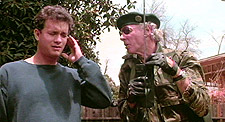 After "Punchline," Hanks took a vacation into the kind of lighter, box office-friendly fare that would put him far away from any danger of winning an Oscar. First, there was a notoriously high concept cop-comedy pairing him with a slobbery pooch ("Turner and Hooch"), and then came Joe Dante's un-ambitious horror spoof dealing with the age-old suburban question of "just what are those freaky neighbors down the street doing?" "The 'Burbs" brings us Hanks as a typical suburbanite male who decides, against the very strong advice of his aggravated wife (Carrie Fisher), to take a "staycation," arguing that it's more relaxing to hang around the house than to head off for some pricey resort. Of course, relaxation becomes the furthest thing from his mind as he and an assortment of wacky neighbors obsess over a menacingly "eccentric" all-male family who've moved in across the street. "The 'Burbs" gives Hanks the chance to play straight man to one of the more eccentric casts of any of his films, including the reliably insane Bruce Dern as a gung-ho veteran; Corey Haim well-cast as a dim teen; cult comic Brother Theodore; and the great Henry Gibson ("Nashville," "Wedding Crashers") as the head of the creepy Klopek family. While it gets old by the end, and you could easily argue that this was an artistic step backward, it's a welcome workout of Hanks' considerable physical comedy attributes and his very real abilities as a comedy team player.
After "Punchline," Hanks took a vacation into the kind of lighter, box office-friendly fare that would put him far away from any danger of winning an Oscar. First, there was a notoriously high concept cop-comedy pairing him with a slobbery pooch ("Turner and Hooch"), and then came Joe Dante's un-ambitious horror spoof dealing with the age-old suburban question of "just what are those freaky neighbors down the street doing?" "The 'Burbs" brings us Hanks as a typical suburbanite male who decides, against the very strong advice of his aggravated wife (Carrie Fisher), to take a "staycation," arguing that it's more relaxing to hang around the house than to head off for some pricey resort. Of course, relaxation becomes the furthest thing from his mind as he and an assortment of wacky neighbors obsess over a menacingly "eccentric" all-male family who've moved in across the street. "The 'Burbs" gives Hanks the chance to play straight man to one of the more eccentric casts of any of his films, including the reliably insane Bruce Dern as a gung-ho veteran; Corey Haim well-cast as a dim teen; cult comic Brother Theodore; and the great Henry Gibson ("Nashville," "Wedding Crashers") as the head of the creepy Klopek family. While it gets old by the end, and you could easily argue that this was an artistic step backward, it's a welcome workout of Hanks' considerable physical comedy attributes and his very real abilities as a comedy team player.
"Joe Versus the Volcano" (1990)
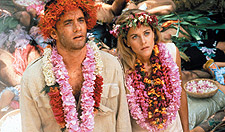 Early on, 1990 was looking to be a great year for Tom Hanks. Still on his post-"Big" roll, he had two major films in the hopper. One was a highly anticipated, big-budget, all-star adaptation of a massive literary sensation, but first there was the directorial debut of playwright-turned-Oscar-winning-screenwriter John Patrick Shanley, hot off the success of "Moonstruck." Hanks here is Joe Banks, a deeply depressed hypochondriac who is diagnosed with a terminal "brain cloud," and is then given the job to end a lifetime – an all-expenses paid trip to an exotic island, where his one and only task is to jump into an active volcano. "Joe Versus the Volcano" may be a lot of things, and that included "huge box-office disappointment," but ordinary, it is not. At first, we can see Hanks struggling to play a character more alive than dead, but even as writer-director Shanley flails about with his own laudable ambition, Hanks finds his way alongside the spiritual struggles of his own character. Crucially, in the first of his three movies opposite Meg Ryan (playing, coincidentally, three roles), he begins to cement the whole "romantic chemistry" thing, which would help make him an immensely wealthy man in years to come. Like his director, who a mere 18 years later ultimately found some big screen success with "Doubt," Mr. Hanks would be back. But for now, the knives would be out. That literary adaptation we mentioned was "Bonfire of the Vanities." Not a hit.
Early on, 1990 was looking to be a great year for Tom Hanks. Still on his post-"Big" roll, he had two major films in the hopper. One was a highly anticipated, big-budget, all-star adaptation of a massive literary sensation, but first there was the directorial debut of playwright-turned-Oscar-winning-screenwriter John Patrick Shanley, hot off the success of "Moonstruck." Hanks here is Joe Banks, a deeply depressed hypochondriac who is diagnosed with a terminal "brain cloud," and is then given the job to end a lifetime – an all-expenses paid trip to an exotic island, where his one and only task is to jump into an active volcano. "Joe Versus the Volcano" may be a lot of things, and that included "huge box-office disappointment," but ordinary, it is not. At first, we can see Hanks struggling to play a character more alive than dead, but even as writer-director Shanley flails about with his own laudable ambition, Hanks finds his way alongside the spiritual struggles of his own character. Crucially, in the first of his three movies opposite Meg Ryan (playing, coincidentally, three roles), he begins to cement the whole "romantic chemistry" thing, which would help make him an immensely wealthy man in years to come. Like his director, who a mere 18 years later ultimately found some big screen success with "Doubt," Mr. Hanks would be back. But for now, the knives would be out. That literary adaptation we mentioned was "Bonfire of the Vanities." Not a hit.
"That Thing You Do!" (1996)
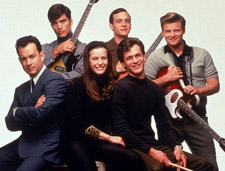 So 1990 kind of sucked, but 1992 through 1995 was extremely good to Hanks. After back-to-back Oscars for "Philadelphia" and "Forrest Gump," and smash hits "Sleepless in Seattle," "Apollo 13," and "Toy Story," Hanks possessed as much Hollywood capital as any sentient creature. "That Thing You Do!" is the result – so far, his only feature film as either a writer or director. The movie, about the birth, life and death of an early '60s rock and roll band, wasn't much at the box office, but it more than earns its cult status as an infectious ode to the joys of music and music making. With the help of director Jonathan Demme's production team, Hanks made any number of correct decisions, including allowing himself a prominent supporting role in the film as the band's calculating manager. As if understanding that this very sweet cocktail of a film needed a dash of bitterness, Hanks' enigmatic Mr. White adds an important note of comic irony and dramatic tension. When asked what the Wonders should do if the audience wants an encore, his response is direct: "You unplug and you run, run offstage! Smiling, smiling, of course." Mr. White is driven by something -- we don't know what. However, viewers of the looser and ever-so-slightly racier "extended" DVD version of the film will get a revealing glimpse into a personal side of Mr. White that directly connects him to other Hanks' characters, pop music history, and some of his creator's better known political and social views.
So 1990 kind of sucked, but 1992 through 1995 was extremely good to Hanks. After back-to-back Oscars for "Philadelphia" and "Forrest Gump," and smash hits "Sleepless in Seattle," "Apollo 13," and "Toy Story," Hanks possessed as much Hollywood capital as any sentient creature. "That Thing You Do!" is the result – so far, his only feature film as either a writer or director. The movie, about the birth, life and death of an early '60s rock and roll band, wasn't much at the box office, but it more than earns its cult status as an infectious ode to the joys of music and music making. With the help of director Jonathan Demme's production team, Hanks made any number of correct decisions, including allowing himself a prominent supporting role in the film as the band's calculating manager. As if understanding that this very sweet cocktail of a film needed a dash of bitterness, Hanks' enigmatic Mr. White adds an important note of comic irony and dramatic tension. When asked what the Wonders should do if the audience wants an encore, his response is direct: "You unplug and you run, run offstage! Smiling, smiling, of course." Mr. White is driven by something -- we don't know what. However, viewers of the looser and ever-so-slightly racier "extended" DVD version of the film will get a revealing glimpse into a personal side of Mr. White that directly connects him to other Hanks' characters, pop music history, and some of his creator's better known political and social views.
"Road to Perdition" (2002)
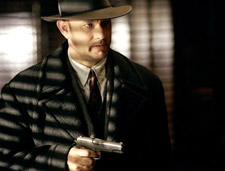 Hitman Michael Sullivan is as close to a serious film villain as Hanks has ever allowed himself to play. Nevertheless, he's no villain at all; we can't help but root for a father trying to protect his sole-surviving child (Tyler Hoechlin) and take revenge on the human slime who murdered the rest of his family. Unfortunately, Sam Mendes's adaptation of the ultra-violent pulp-gangster graphic novel tries to hide its violence through portentous epic tropes that make the film feel as if it's encased in aspic. But Hanks' performance very nearly compensates for Mendes's error. Stripped of all his usual nice guy/smart aleck mannerisms – stripped of any mannerisms at all, actually – Sullivan is uninterested in anyone's sympathy. He is committed to his deadly task for the love for his son and the memory of his family, the only feelings he is unable to hide, and he clearly would prefer to hide those as well. The cold, clear beauty of Hanks' performance saves the movie from its director's misguided priggishness regarding bloodshed, and the chemistry he works up with Paul Newman and Daniel Craig, as a very bad father surrogate and a far worse faux-brother, respectively, is anything but bloodless. If only Mendes had allowed "Road to Perdition" to be more like the "popcorn movie" he said he didn't want to make, Tom Hanks great performance might have been in an equally great film.
Hitman Michael Sullivan is as close to a serious film villain as Hanks has ever allowed himself to play. Nevertheless, he's no villain at all; we can't help but root for a father trying to protect his sole-surviving child (Tyler Hoechlin) and take revenge on the human slime who murdered the rest of his family. Unfortunately, Sam Mendes's adaptation of the ultra-violent pulp-gangster graphic novel tries to hide its violence through portentous epic tropes that make the film feel as if it's encased in aspic. But Hanks' performance very nearly compensates for Mendes's error. Stripped of all his usual nice guy/smart aleck mannerisms – stripped of any mannerisms at all, actually – Sullivan is uninterested in anyone's sympathy. He is committed to his deadly task for the love for his son and the memory of his family, the only feelings he is unable to hide, and he clearly would prefer to hide those as well. The cold, clear beauty of Hanks' performance saves the movie from its director's misguided priggishness regarding bloodshed, and the chemistry he works up with Paul Newman and Daniel Craig, as a very bad father surrogate and a far worse faux-brother, respectively, is anything but bloodless. If only Mendes had allowed "Road to Perdition" to be more like the "popcorn movie" he said he didn't want to make, Tom Hanks great performance might have been in an equally great film.
"The Terminal" (2004)
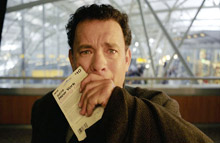 The third film placing Steven Spielberg and Tom Hanks together didn't get the kind of epic attention of "Saving Private Ryan," nor did it generate the widespread praise or grosses of "Catch Me if You Can." But this heart-tugging, Chaplin-esque political comedy proves that the 50-something Hanks can still do funny and huggable better than any A-lister alive. This time, he's traveler Viktor Navorski, whose Eastern European homeland falls into anarchy just as he's going through customs at JFK. This leaves him as a legal man without a country; he can neither return home legally nor walk upon United States soil without risking arrest. Trapped in airport limbo, Viktor learns English, spars with an absurdly callous official (Stanley Tucci), falls for the world's most awesome flight attendant (Catherine Zeta-Jones), plays cupid for a new buddy (Diego Luna) smitten with a pretty immigration agent (Zoe Saldana), and even makes a decent living for himself. Hanks is no Peter Sellers or Alec Guinness-style human chameleon, but he pulls off not only Viktor's thick Slavic accent (it probably helps that his native Krakozhia is entirely fictitious), but also pulls the audience through an improbable situation and keeps us focused on the openly sentimental story. The superstar does so on the sheer strength of his skill, commitment, his gift for physical humor and, yes, just plain niceness and likability. "Niceness and likability." Will Tom Hanks ever escape from that perceptual straitjacket? Stay tuned.
The third film placing Steven Spielberg and Tom Hanks together didn't get the kind of epic attention of "Saving Private Ryan," nor did it generate the widespread praise or grosses of "Catch Me if You Can." But this heart-tugging, Chaplin-esque political comedy proves that the 50-something Hanks can still do funny and huggable better than any A-lister alive. This time, he's traveler Viktor Navorski, whose Eastern European homeland falls into anarchy just as he's going through customs at JFK. This leaves him as a legal man without a country; he can neither return home legally nor walk upon United States soil without risking arrest. Trapped in airport limbo, Viktor learns English, spars with an absurdly callous official (Stanley Tucci), falls for the world's most awesome flight attendant (Catherine Zeta-Jones), plays cupid for a new buddy (Diego Luna) smitten with a pretty immigration agent (Zoe Saldana), and even makes a decent living for himself. Hanks is no Peter Sellers or Alec Guinness-style human chameleon, but he pulls off not only Viktor's thick Slavic accent (it probably helps that his native Krakozhia is entirely fictitious), but also pulls the audience through an improbable situation and keeps us focused on the openly sentimental story. The superstar does so on the sheer strength of his skill, commitment, his gift for physical humor and, yes, just plain niceness and likability. "Niceness and likability." Will Tom Hanks ever escape from that perceptual straitjacket? Stay tuned.
You can follow us on Twitter and Facebook for content updates. Also, sign up for our email list for weekly updates and check us out on Google+ as well.











